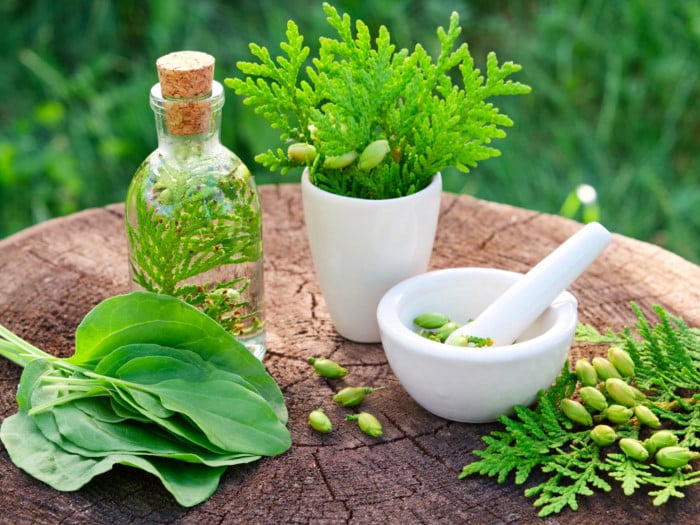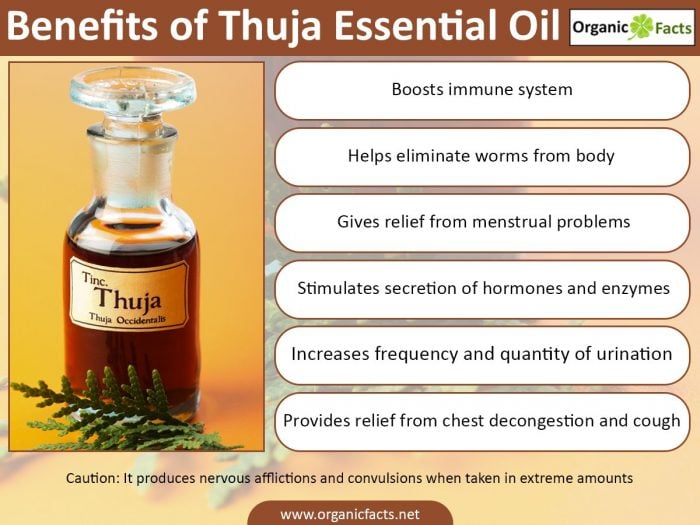The health benefits of thuja essential oil can be attributed to its potential properties as an astringent, diuretic, emmenagogue, expectorant, insect repellent, rubefacient, stimulant, tonic, and vermifuge substance.
What is Thuja Essential Oil?
Thuja essential oil is extracted from the thuja tree, scientifically known as Thuja occidentalis, a coniferous tree. Crushed thuja leaves emit a pleasant smell, which is somewhat like that of crushed eucalyptus leaves, but sweeter. This smell comes from some of the components of its essential oil, predominantly some variants of thujone.
The chief constituents of this oil are alpha-pinene, alpha-thujone, beta-thujone, bornyl acetate, camphene, camphone, delta sabinene, fenchone, and terpineol. This essential oil is extracted by steam distillation of its leaves and branches. [1]
Health Benefits of Thuja Essential Oil
The amazing health benefits of thuja essential oil include the following: [2]
May Help Relieve Rheumatism
There are two main reasons responsible for rheumatism. First, the deposition of uric acid in the muscles and joints, and second, an improper and obstructed circulation of blood and lymph. For these causes, some properties of the essential oil of thuja may prove beneficial. First and foremost, it is a potential detoxifier by virtue of the possible diuretic properties that it possesses. Due to this, it may increase urination and thus speeds up the removal of the toxic and unwanted substances in the body such as excess water, salts, and uric acid through the urine.
The second contributor is its possible stimulant property. Being a stimulant, it may stimulate the flow of blood and lymph, otherwise known as an improvement of circulation. This brings warmth to the affected places and inhibits uric acid from accumulating at those places. Combined together, these properties give relief from rheumatism, arthritis, and gout. [3]

A critical factor for Thuja’s use as a medicinal herb is its content of essential oil. Photo Credit: Shutterstock
May Act as an Astringent
An astringent is a substance which can make muscles (tissues), nerves, and even blood vessels contract or shrink, and can sometimes have a cooling effect. Astringents that are meant for external applications may induce local contractions. One such example is the fluorides and other compounds used in toothpaste. To have this effect of contraction on all the organs of the body, the astringent needs to be ingested so that it mixes with the bloodstream and reaches all parts of the body.
Most of those astringents are herbal products, just like the essential oil of thuja. Now, what happens when it is ingested? It may mix with the blood and induces contractions in the gums, muscles, skin, and at the roots of the hair which may strengthen the hold of gums on teeth, might make muscles firm, and possibly gives a lift to the skin, may prevent hair loss and makes you feel fit and younger. Furthermore, it makes the blood vessels to contract, which can slow down or stop hemorrhaging from torn or cut vessels.
May Promote Urination
Thuja essential oil’s possible diuretic property may make it a detoxifier. It may increase the frequency and quantity of urination. This may help keep the body healthy and free of diseases as it can remove the unwanted water, salts, and toxins like uric acid, fats, pollutants, and even microbes from the body. It can help cure diseases like rheumatism, arthritis, boils, moles, and acne, which are caused by the accumulation of these toxins. It can also help reduce weight by removing water and fat and helps get rid of problems like swelling and edema. Furthermore, the calcium and other depositions in the kidneys and urinary bladder are washed away with the urine. This prevents the formation of stones and renal calculi.
Possible An Emmenagogue
This property of thuja essential oil is very helpful for women. It may give them relief from obstructed menses as well as from the abdominal pain, cramps, nausea, and fatigue associated with periods. It can also make periods regular and keeps the female reproductive organs in good health by promoting the secretion of certain hormones like estrogen and progesterone.
May Act As A Remedy for PCOS
The journal of ethnopharmacology has published an article in 2015, which suggests that thuja essential oil is helpful in treating polycystic ovary syndrome (PCOS). This is possible due to the presence of the active compound called alpha-thujone in it. [4]
May Clear Respiratory Tract
One needs an expectorant for expelling phlegm and catarrh deposited in the respiratory tracts and lungs. This essential oil is an expectorant. It can give you a clear, decongested chest, help you breathe easily, clear out mucus and phlegm, and give relief from coughs. [5]
Potential Insect Repellant
Thuja essential oil has antimicrobial properties. The toxicity of this essential oil can kill many bacteria, insects and keeps them away from households or areas where it is applied. This is as true for parasitic insects like mosquitoes, lice, ticks, fleas, and bed bugs as it is for other insects found in households like cockroaches, ants, white ants, and moths. This oil can replace those costly, synthetic chemicals in mosquito and cockroach repellant sprays, fumigants, and vaporizers. [6] [7]
May Act as a Rubefacient
This is another outcome of the irritant property of thuja essential oil, which again comes from its stimulating properties. This oil can produce very mild irritation on the skin and stimulates the circulation of blood below the skin, which, when added together, makes the skin look red. Since it is more visible on the face, this property is called a rubefacient, meaning “Red Face”, property. Besides making you look more vibrant, this also helps in the regeneration and rejuvenation of the skin due to increased circulation of blood.
May Stimulate Blood Circulation
Besides stimulating blood circulation, thuja essential oil can stimulate the secretion of hormones, enzymes, gastric juices, acids, and bile, as well as stimulating peristaltic motion, and the nerves, heart, and brain. Furthermore, it can stimulate the regeneration of growth cells, erythrocytes, leukocytes, and platelets.
May Kill Intestinal Worms
The toxicity of thuja essential oil, due to the presence of thujone, may help kill worms that may have infected the body. It can eliminate worms like roundworms, tapeworms, and hookworms that can result in a number of uncomfortable and dangerous health conditions.

Thuja essential oil helps boost the immunity. Photo Credit: Shutterstock
May Improve Metabolic Functions
The essential oil of thuja tones and fortifies, therefore making it a tonic. It can tone up all the functions in the body. It may improve metabolic functions like anabolism and catabolism while toning up the liver, stomach, and intestines, thus helping in growth. It can also tone up the excretory, endocrinal and nervous systems operating in the body and ensures proper excretion. Furthermore, it may promote the endocrinal secretions of hormones and enzymes and keeps you more alert and active. It tones up the immune system, protecting you from infections. And as you well know, a toned mind can only properly live in a toned body!
Other Benefits
It can be used to treat coughs, cystitis, warts, moles, and other eruptions, abnormal cellular growths, and polyps.
Word of Caution: This oil is toxic, abortifacient, and irritating to the digestive, urinary, and reproductive systems. Its smell may be very pleasant, but it is important to note that one should avoid excessive inhalation of it since it can produce irritation in the respiratory tract as well as nervous afflictions since it is made of neurotoxic compounds. It can also produce nervous afflictions and convulsions when taken in extreme amounts since the component thujone present in its essential oil is a potent neurotoxin. It should not be given to pregnant women.
Blending: Thuja essential oil blends well with the essential oils of cedarwood, neroli, geranium, tangerine, mandarin, lavender, and pine needle.
